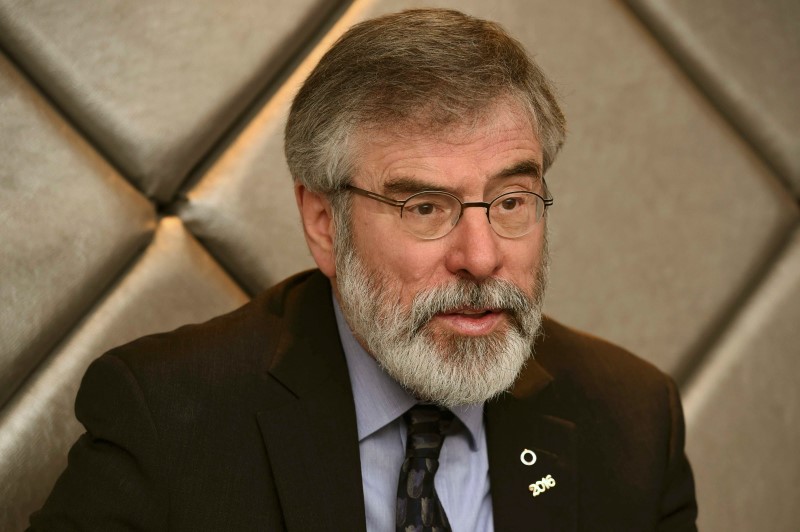By Amanda Ferguson and Conor Humphries
BELFAST/DUBLIN (Reuters) - Northern Irish unionist support to prop up British Prime Minister Theresa May might seem like a death sentence for power-sharing with the province's Irish nationalists, but some think it could actually bring the model back from political limbo.
The key will be whether the concessions the Democratic Unionist Party (DUP) secure in exchange for keeping May's government alive also damage the interests of its nationalist rivals Sinn Fein.
If a coalition agreement avoids the kind of contentious issues that have fuelled the deepest political crisis in Northern Ireland in a decade, it could convince Sinn Fein to soften its demands and reenter a power-sharing government, analysts on both sides of the sectarian divide speculate.
Attempts by May to secure the support of the DUP's 10 members of parliament after her Conservative party lost its majority in a general election last week have caused anxiety and fear among Irish nationalists, one Sinn Fein deputy has said.
But the British election has also changed the political balance within the province. The hitherto crisis-ridden DUP emerged from it stronger than before, meaning Sinn Fein may have to soften some of its recent demands.
"What has happened in recent days gives a much better prospect for the restoration of government at Stormont (Belfast's parliament) than what we were facing in the weeks before hand," Richard Bullick, who until recently was special advisory to DUP leader Arlene Foster, told Ireland's RTE radio.
"The way the cards have fallen it's hard to see how it is in Sinn Fein's interests to have a Conservative government running direct rule, being propped up by the DUP."
Irish nationalist commentators say Sinn Fein still has a strong hand to play. But some who were forecasting a prolonged breakdown are now forecasting a breakthrough by the end of the summer.
"I do think it is still quite feasible that there could be a return to devolution in the autumn if ... the deal that is to be made between the DUP and the Conservative Party is not going to impact upon the identity issues or issues related to the legacy of the past," said Chris Donnelly, a nationalist commentator and former Sinn Fein election candidate.
NORTHERN CRISIS
Northern Ireland's power-sharing government - designed by a 1998 peace deal to force cooperation between pro-British unionists and Irish nationalists who want Ireland to leave the United Kingdom - collapsed in January with Sinn Fein accusing the DUP of arrogantly refusing to treat them as equals.
While no one is predicting a return to the kind of violence that killed 3,600 people in the three decades before a 1998 peace deal, the crisis exacerbates sectarian tensions and freezes local government as Brexit talks enter a crucial stage.
Sinn Fein took a hard line in talks to restore power-sharing, figuring the DUP had been badly damaged by a scandal concerning the abuse of a green energy subsidy and a surge in nationalist support in the wake of Brexit.
It demanded that a weakened Foster step aside during the corruption investigation and presented a shopping list of nationalist demands without making clear what concessions they might offer in return.
Sinn Fein's sense they had the upper had was further boosted by regional elections in March that shocked unionists by denying them a majority in the regional parliament for the first time.
But since the DUP bounced back in the British election to their highest ever haul of 10 seats, Adams had softened that hard line, telling journalists on Monday that Foster's replacement was "of course ... subject to the talks."
After months saying Sinn Fein might remain outside of power-sharing if it was not treated equally, Adams said returning to government was "strategically ... the way to a united Ireland," the party's ultimate goal.
How fast they will seek a deal is another question.
Britain's Northern Ireland minister James Brokenshire has set June 29 as a "final and immovable" deadline for talks to avoid government power reverting from the Northern Ireland parliament back to London.
Brokenshire has extended that deadline three times already, will Sinn Fein may wait to see how the DUP-Conservative deal plays out before making any compromises.
RED LINES
The DUP has not laid out its demands, but a list it published before the 2015 general election included several red line issues for nationalists.
Special status for former members of the British armed forces in Northern Ireland would anger Sinn Fein, which demands equal treatment for former militants.
The DUP has said it wanted "constitutional stability for Northern Ireland", widely seen as a way to block an attempt by nationalists to hold a referendum on leaving the United Kingdom.
A source close to the DUP said the talks would focus mainly on funding for Northern Ireland, but that concessions for the British military were likely to come up.
"There are a lot of people saying that this (election) will put pressure on Sinn Fein to get something up and running. (But) it exclusively depends on the deal," said Brian Feeney, a Belfast-based historian.
"It very much depends on what comes out," said Feeney, who is also a political commentator for the nationalist Irish News.
